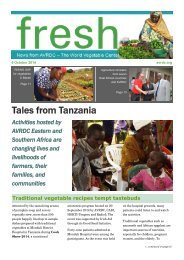2015-06_WFO_Farmletter_ENG_web
2015-06_WFO_Farmletter_ENG_web
2015-06_WFO_Farmletter_ENG_web
Create successful ePaper yourself
Turn your PDF publications into a flip-book with our unique Google optimized e-Paper software.
<strong>WFO</strong> F@rmletterFARMATORYMatteo BartoliniPRESIDENT OF CONSEIL EUROPÉENDES JEUNES AGRICULTEURS (CEJA)YOUNGFARMERSAS ENERGYFOR LIFETThe term “young farmers”is one which has gainedtraction of late, particularlyin Europe. Consideringthat, on average, a third offarmers in the EuropeanUnion (EU) are now overthe age of 65, it is no surprise that theissue of attracting more young entrepreneursto the sector, as well as giving themthe tools necessary to start farming andstay afloat in it, has come to the fore ofthe debate.Not just in Europe but across the world, people are leaving rural areas to find better prospectsin urban ones. The need to redress this flow and rebalance the demographics ofglobal agriculture has become an urgent one – because, as the title of this piece suggests,young farmers embody energy for life.Young farmers can be defined as energy for life in a number of ways – firstly, as thosewho will be producing our food in the future and therefore securing our food supply.Equally important though, young farmers are the future custodians of our rural areasas engines of employment, productivity and rejuvenation who also have responsibilitiesin terms of environmental sustainability and biodiversity conservation. Young farmersare ambitious, brave, determined entrepreneurs who take on a lifetime of difficult butimmensely rewarding work delivering public goods to the rest of society. They are theenergy for life in terms of food production as well as guardians of the world’s naturalresources which we will need to ensure the supply of safe, nutritious, high-quality foodto a growing world population.However, young farmers are not just the farmers of tomorrow. Those young people whoare already farmers are, on average, more productive, innovative, better-educated andcompetitive than their older counterparts 1 . They are also more in tune with environmentaland sustainability needs for the future and grasping new technologies and innovativefarming methods to ensure productivity goes hand in hand with sustainability. Asyoung farmers, this is in their interest, too, to ensure they can keep farming throughouttheir career before passing this on to the next young generation. It is for this reason thatyoung farmers need the policy tools and support mechanisms to successfully put theireducation, ambition and entrepreneurship to good use. Across the world today, it is simplytoo difficult to access the agricultural sector.There is little doubt that young farmers contribute significantly to energy for life – butthey have the potential to produce so much more of it, particularly with youth unemploymentat concerning levels especially in rural areas. It is essential that we make thetools available to young people to be able to access the land and credit they need to beable to establish themselves firmly in the sector and therefore contribute to global foodsecurity and sustainability. For this, we need to improve succession rates across the glo-be, encouraging older farmers to give wayto younger farmers earlier and reshapingthe regulatory framework to do so. Wemust also attract new young entrantsto the farming sector to inject new innovativeideas into farming for the future.All they need is the opportunity to provethemselves, and they will not let us down.CEJA is working on several related topicsat the moment in this context, includingSoils, Food Waste, Trade Partnerships anda Fair Food Supply Chain – not to mentionthe promotion of young farmers’ measures,in particular better access to creditin the first years of the business. It is crucialthat young farmers come together toexplain what is necessary to help youngpeople enter the sector and to make themost out of it – in terms of productivityand profitability, but also in terms of maximisingenvironmental protection, biodiversityconservation and climate changemitigation in order to ensure sustainabilityand continuity for the future, across theworld. It is for this reason that CEJA haspioneered the establishment of the <strong>WFO</strong>Youth Group, and implores farmers of allages to mobilise behind the cause of betteraccess to land and credit for young peoplein order to stem the tidal flow of urbanmigration and shift the demographicbalance to a more sustainable age range inthe sector – this should have the supportof all farmers’ organisations.If everyone on this planet is going to havethe energy for life that they need, we aregoing to have to ensure there is an increasein young farmers everywhere. In orderto do this, we must be vocal about our needsand gain support not just from withinthe young farming sector, not just withinthe farming sector, but from the rest ofsociety too. Young farmers could providepotential solutions to substantial challengesthat stand in the way of obtaining ourenergy for life; but only if we give them thehelping hand they need to overcome thehuge challenges that stand in their wayfirst. We hope this will be a main themerunning through the EXPO Milano <strong>2015</strong>,because we simply cannot talk about ‘Feedingthe Planet, Energy for Life’ without acentral focus on young farmers.1 http://ec.europa.eu/agriculture/rural-area-economics/briefs/pdf/09_en.pdf22



